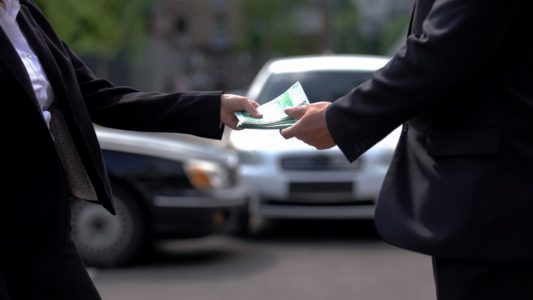If a passenger in a car involved in an accident sustains injuries and other damages, they may be able to recover full compensation from the liable parties responsible. But how much money can a passenger in a car accident get? Remuneration will depend on the case circumstances, including the severity of the injuries sustained and the degree of liability.
You need a lawyer who understands what goes into calculating compensation and determine how much you may recover as a passenger in a car accident.
What Factors Affect Car Accident Compensation?

The amount of compensation you might recover in a car accident depends on several factors, including the specific types of losses you experienced and the ability of the liable party to pay.
Regarding damages, you may recover a combination of economic, non-economic, and punitive damages. Economic damages involve a specific financial loss that’s easy to quantify. In contrast, non-economic damages apply to the pain and suffering that people experience, which is less tangible and harder to calculate.
The following are some specific economic and non-economic damages that can influence the total amount you may be entitled to recover.
Medical Expenses
If you and other occupants in a vehicle sustained injuries, one of the biggest economic damages is medical expenses.
There many potential costs associated with treating injuries and recovering include:
- Emergency care. In many cases, accident victims need immediate treatment after an accident occurs. They may need an ambulance to transport them to a nearby hospital and treatment in an emergency room, among other measures, which can come with steep costs. Compensation may help cover these expenses if you require immediate care.
- Diagnostics. To determine the extent of your injuries, doctors may perform various diagnostic procedures, including X-rays and CT scans, that help them better understand the nature of your injuries. These can also come with high costs for which you may be able to recover compensation. These same procedures may also help monitor your recovery progress as you heal until you reach maximum medical improvement (MMI). At this point, doctors will deem you recovered as much as possible.
- Hospitalization. Depending on the severity of your injuries, you may also require hospitalization. Similar to emergency care, hospitalization can account for a large chunk of medical costs. The longer you need to stay in the hospital, the more your bills will accumulate and add to other medical expenses for procedures and treatment.
- Surgical treatment and other procedures. Some injuries may require surgery and other invasive or non-invasive procedures to assist with recovery. These procedures can come with numerous costs, including those for the treatment itself, anesthesia, and other medical care expenses.
- Therapy. To help recover fully, you may need different types of therapeutic treatment, including:
- Physical therapy that helps restore your body to how it was before your injuries or as much functionality as possible.
- Occupational therapy that helps you relearn daily tasks.
- Psychological therapy that helps you get through trauma and cope with any lasting changes resulting from the accident.
These types of therapy are often expensive, and you may require them in the long term to make a complete recovery.
- Assistive medical equipment. To help facilitate recovery or improve mobility, you may also need specific medical equipment such as wheelchairs, braces, and crutches. These are often expensive and further contribute to overall medical expenses.
- Modifications to accommodate disabilities. If you suffer from a long-term or permanent disability, you may also need to make certain modifications to your home and other property. For example, you may need to install ramps at your house to enable access to doors, lifts on staircases that allow you to ascend and descend stairs, and new vehicles or controls that enable you to continue driving or accessing vehicles as a passenger.
Property Damage
Another potential economic damage is damage to your property. For example, if the vehicle you were a passenger in at the time of the accident was your vehicle, you may be able to recover compensation for its damage. If the accident caused damage to your home or another property you own, you could also recover compensation for these damages.
Lost Income and Earning Capacity
Some injuries may render you unable to work temporarily or permanently. Even if you can return to work, you may be unable to work in the same capacity as you could before the injury. In any case, you may qualify to recover lost wages during this time along with lost earning capacity.
Pain and Suffering
This refers to the physical and psychological pain victims experience after an accident. Cases often involve these types of damages and clearly defined economic damages. These non-economic damages are not as easy to calculate as economic damages because of their less tangible nature. They vary from person to person, with some experiencing minimal pain and suffering while others suffer from debilitating pain and anguish.
Some specific types of pain and suffering that can impact compensation include:
- Physical pain resulting from injuries
- Psychological distress, such as anxiety and depression
- Post-traumatic stress
- Disfigurement
- Loss of enjoyment of life
- Loss of companionship and consortium
Although these damages aren’t as easy to quantify as economic damages, they can still contribute to a settlement amount. Attorneys, insurers, and courts use certain methods to calculate these damages.
Punitive Damages
In rare cases, car accident victims may recover punitive damages that complement economic and non-economic compensatory damages. The court awards punitive damages when defendants act in grossly negligent or malicious ways. The intent is to prevent these defendants and others from engaging in the same behavior and causing additional accidents.
The Statute of Limitations for Car Accidents
Another factor that can affect the compensation you recover is the statute of limitations. This is the specific amount of time you have to file a claim or lawsuit against liable parties and their insurance companies.
The statute of limitations will depend on the specific type of case and where it takes place. Different states provide particular laws, which you can check with your local government. For example, in New York, the statute of limitations for car accidents is three years. This means you have three years from the accident to file a claim or lawsuit.
If you fail to file within this time, you may be unable to recover any compensation for an accident, or you may significantly reduce your settlement amount. Also, insurance companies may have their own statutes of limitations for underinsured and uninsured claims, requiring some individuals to file even earlier.
Some exceptions to the statute of limitations may apply, but these instances are rare. For example, victims under 18 at the time of the accident might wait until they reach this age to file a claim or lawsuit on their own, which may take longer than three years.
It’s in your best interest to build a case and file it against negligent parties right away. The earlier you file, the faster you can receive full compensation and avoid passing the statute of limitations. An attorney may help you by collecting all necessary evidence and filing a claim or lawsuit to begin the process
Who Is Liable for Car Accidents?
The total amount of compensation could also depend on the parties responsible for the accident and their role. Several potentially liable parties could cause an accident and injuries to passengers, drivers, and pedestrians.
Some of the liable parties in these types of cases may include:
The Driver of the Vehicle You Were in at the Time of the Crash
The driver of the vehicle you were in when the accident occurred may be liable for the accident, in which case you might seek compensation from this individual. This could include a friend, family member, or colleague.
Many people who sustain injuries because of the negligence of someone they know could be uncomfortable suing them for damages. However, you would typically file a claim against insurance companies in these cases instead of the driver. If the driver has insurance, their policy should be able to pay out full compensation in most cases.
Other Drivers
Accidents could also involve other drivers who collide with your driver’s vehicle. The liable driver’s insurance company should cover the damages if this is the case.
However, some cases may involve multiple negligent drivers, requiring victims to seek compensation against all of their insurers via more than one claim. If you believe several drivers could be liable for your accident and injuries, consult with an attorney to assist with your claims. An experienced attorney may be able to help you identify all liable parties and file claims with sufficient evidence backing your case.
Employers
Certain employers might be liable for accidents if one or more of their employees were involved. For instance, rideshare companies may be liable if the responsible driver was operating a vehicle in the scope of employment. You may also be able to hold other employers liable for accidents if their employees were drivingwhile on the job.
Some trucking companies may also be negligent in hiring truck drivers and, subsequently, be liable for accidents their employees cause. Trucking companies may also be responsible if they fail to properly maintain the vehicles in their fleet, leading to disrepair orl malfunctions that cause an accident.
Manufacturers
In some instances, manufacturers of vehicles or individual auto parts could be responsible for accidents. They may be behind faulty designs or manufacturing processes that produce hazardous components contributing to accidents.
For example, a vehicle might have faulty brakes that prevent drivers from coming to a complete stop before colliding with other vehicles. Defective seatbelts and other safety devices may also fail, leading to potentially preventable severe injuries.
Mechanics
Mechanics and repair shops may be liable for accidents if they fail to check vehicles for any issues requiring repairs or replacement parts, perform insufficient maintenance, or otherwise engage in negligence that leads to an accident at a later point.
An experienced car accident lawyer will work to identify all liable parties in these cases and help determine how they contributed to an accident.
Speaking With a Car Accident Attorney
Car accident cases are often complex and involve many factors influencing the total compensation that victims can recover. You may not need an attorney if your case involves minor injuries, minimal property damage, and one liable party. On the other hand, if your case is complex and a lot is at stake, insurance companies and responsible parties will fight harder to avoid paying the full compensation victims deserve.
To avoid potential issues when seeking compensation in a car accident case, consult with an experienced attorney. They can meet with you in a free consultation to discuss your case and the kind of compensation you might be able to recover.
Your lawyer can build a strong case that helps you and other victims get the full compensation you deserve from drivers and other liable parties. Call a reputable attorney today for a free claim evaluation, where you can learn about your legal options as a passenger in a vehicle accident.

